MNZ Interview: Capital BS 006: Nigel Mauchline - The Stomach

Capital BS caught up with Nigel Mauchline from The Stomach in Palmerston North about opportunities, loud amps and the benefits of not selling booze...
Tell us a bit about Creative Sounds and your job within it...
Just to clarify... Creative Sounds is the name of the incorporated society and the collective that help to run the organisation. The Stomach is actually technically the name of the live venue but over time that name has become synonymous with the building and everything that goes on within it.
So Creative Sounds has actually been around for quite a long time, it was actually founded in 1988, just as a group of musicians who wanted to get together and make some noise really. And that really burst into the scene of Palmerston North for up and coming musicians. That has since developed, we have a great on-going relationship with the local council who are very supportive of creative arts. We are really lucky to have that relationship, which has helped us to develop Creative Sounds into what it is today, which is really a central hub for music. We operate as a non-profit charity, it’s quite a unique establishment in that sense. There’s nothing really quite like it in the country based on our history and the services that we provide at the prices we do.
How long have you been involved?
I’ve been here for five years now and my primary role here is sound engineer, both in the live room (we have a live gig room) and also in the recording studio. The studio is where I spend most of my time, it’s a busy little studio.
Briefly switching over to the venue side of things, what do you think the benefits are of being an all-ages venue?
I think the biggest advantage we have is allowing people of all ages to learn to perform. We can put on big shows as well but there are plenty of places to do that - but there aren’t many places to get out and experiment with your original music in front of a live audience.
 The idea is that people who aren’t 18 can get out there and get the experience, not only to perform in front of people but to perform live, original music way before they’d normally get to do that. Normally you have to wait until you’re 18 and have the chance to play in a pub to get that exposure and that learning. We have kids as young as ten years old on the stage and it’s just such a unique opportunity for them to be able to gather such experience at such a young age. By the time they become able to go and play in a pub they are already seasoned musicians. It’s just giving them a bit of a leg up. It’s great to have somewhere that you can just come and not be judged on the type of music you play or the clothes you wear or how loud you wanna turn your amp up.
The idea is that people who aren’t 18 can get out there and get the experience, not only to perform in front of people but to perform live, original music way before they’d normally get to do that. Normally you have to wait until you’re 18 and have the chance to play in a pub to get that exposure and that learning. We have kids as young as ten years old on the stage and it’s just such a unique opportunity for them to be able to gather such experience at such a young age. By the time they become able to go and play in a pub they are already seasoned musicians. It’s just giving them a bit of a leg up. It’s great to have somewhere that you can just come and not be judged on the type of music you play or the clothes you wear or how loud you wanna turn your amp up.
It’s good for the parents to understand that there is no booze, and that that’s not what it’s about, so that they feel comfortable to drop their kids off here. Because we’re a social institution people understand when they walk through the door that they’re coming to a safe environment and that everyone’s just here to have a good time and to celebrate original music.
What role do you think local recording studios play in supporting NZ music?
I think they have a huge role to play. In terms of accessibility a lot of other bigger town studios are either quite hard to get into or quite costly to get into and you sometimes have to be doing quite well for yourself as a musician to even get the opportunity to get into one of those studios, as lovely as they are. We really do help to provide people with access to a great facility and the chance to learn how to behave in the facilities and what to expect before you go into a big studio. We often find that people think they’re ready to record but once they get into the studio under the microscope they can realise how much more work they want to do before recording. Being able to do that in a bit more of a chilled environment is a great learning opportunity.
Could you elaborate on the subsidised fees?
We have two rehearsal spaces that are fully inclusive, you know, drum kit, guitar amps, guitars, bass’, keyboard, vocal PA, and16 year-olds and under can actually use those rooms for $5 per hour – that's per room not per person so you can have a band of five people paying $1 each. A recording studio can be hired from as little as $25 per hour and that includes myself as your engineer and all of the equipment that we have in the building. Our local rates, for people who are working, are $40 per hour. We’re funded to Manawatu, Palmerston North, Horowhenua. And outside of those areas the hourly sound rate is $65 and that’s purely because the funding is cut.
In terms of the music you record, would you say that it is mostly local music from Palmerston North?
Almost entirely yes. And there are quite a few musicians around here, I find myself fully booked a month or two months in advance.
Are many of those musicians under 16?
There are and it’s increasing all the time. We have a lot to do with Rockquest and we do sponsor prizes for Rockquest winners to come in and have a chance to record their songs with us as well. We also try and encourage all high school students to come in as often as possible and run workshops during school holidays. We’d always love to have more here but we’re doing well.
What would you say are the prominent genres?
For the Stomach itself, it’s the indie rock scene. Punk rock and alternative music. These days though that has diversified a lot. On a daily basis I can be doing anything from reggae to R&B to jazz and literally everything. But in the wider Palmerston North area there’s certainly a lot of different things going on.
Other Interviews By bethany_rachell
 Captain Festus McBoyle's Travellin' Variety Show - MNZ Interview: Capital BS 008: Captain Festus McBoyle
Captain Festus McBoyle's Travellin' Variety Show - MNZ Interview: Capital BS 008: Captain Festus McBoyle
06 Dec 2021 // by bethany_rachell
For volume 8 of Capital BS, Beth caught up with Captain Festus McBoyle about his new radio show Shipwreck Sunday. Bonus content includes: the history of the band name Buzzcocks, the benefits of theatre performance in NZ and some really positive and wholesome take-aways from Covid (yes, they do exist)!
Read More...
05 Nov 2021 // by bethany_rachell
This month Beth caught up with Kelly Wright – head of Homegrown PR – about festivals, gender diversity and our NZ music family.Homegrown 2021 - Wellington WaterfrontPhoto credit: Brady DyerCould you give us a quick synopsis of Homegrown and what it means to you?
Read More...
30 Jun 2021 // by bethany_rachell
Capital BS, live to you from our Capital City, Toby Lloyd of Tiny Triumph Recordings chats to us about All-Blacks, gentrification and demo-itis: Tell us a bit about Tiny Triumph, your role within it, how it came about and everything like that! I worked in the film industry, and at Park Road Production for close to a decade and the whole time I was working there on the Hobbit films and everything like that I was still producing artists and bands.
Read More...
02 Jun 2021 // by bethany_rachell
Capital BS caught up with the crew from Beagle Radio about niche radio genres, passionate music and that one band...With input from:Kim Townsend, Jamie Haigh, David Fleig, Eursula Hicks, and Damian Pullen.
Read More...
02 Jun 2021 // by bethany_rachell
Over a sweet soy flat white in downtown Wellington, Beth had a chat with Harri Robinson about art projects gone right, bankruptcy and vibrant creative scenes...Tell us a bit about Radioactive and your role within the radio station...
Read More...
02 Jun 2021 // by bethany_rachell
Capital BS caught up with James Meharry from RDU about rave-culture, the 90's and music that needs to be heard... Tell us a bit about RDU and your role within the radio station...
Read More...
 MNZ Interview: Capital BS 001: Bianca Bailey from Wiri Donna
MNZ Interview: Capital BS 001: Bianca Bailey from Wiri Donna
04 Apr 2021 // by bethany_rachell
Introducing the first of many new interview series for Muzic.net.
Read More...
 Bad Hagrid Newsletter Interview
Bad Hagrid Newsletter Interview
25 Jan 2021 // by bethany_rachell
On a sunny summer evening in the capital, local band Bad Hagrid played a set in the Wellington Botanical Gardens as part of the Gardens Magic series. The series is always an exciting time in the city and it's shown in the crowd.
Read More...
Most Viewed Artists
Latest Galleries
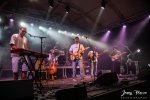
Evan Rhys & the Stereo Streets @ Festival of Lights - Pukekura Park, New Plymouth - 18/01/2025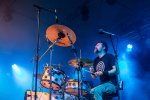
Midwave Breaks @ Festival of Lights - Pukekura Park, New Plymouth - 18/01/2025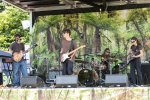
Rumpus Machine @ Music in Parks, Aotea Square, Auckland - 18/01/2025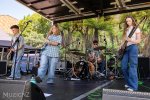
Fan Club @ Music in Parks, Aotea Square, Auckland - 18/01/2025
NZ Top 10 Singles
- APT.
ROSÉ And Bruno Mars - DIE WITH A SMILE
Lady Gaga And Bruno Mars - BIRDS OF A FEATHER
Billie Eilish - TASTE
Sabrina Carpenter - I LOVE YOU, I'M SORRY
Gracie Abrams - ESPRESSO
Sabrina Carpenter - SAILOR SONG
Gigi Perez - LOSE CONTROL
Teddy Swims - A BAR SONG (TIPSY)
Shaboozey - GOOD LUCK, BABE!
Chappell Roan

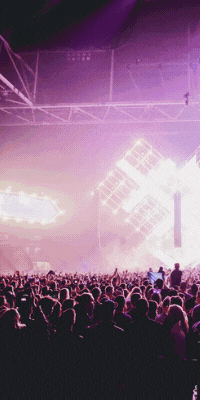


 Report A Problem
Report A Problem

